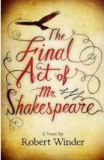The Final Act of Mr Shakespeare
 Robert Winder, The Final Act of Mr. Shakespeare. Little, Brown Book Group, London, 2010. RRP $32.99. ISBN 978-1-4807-0206-2(hardback), 978-1-4807 0230 (C format)
Robert Winder, The Final Act of Mr. Shakespeare. Little, Brown Book Group, London, 2010. RRP $32.99. ISBN 978-1-4807-0206-2(hardback), 978-1-4807 0230 (C format)
This is a novel, so great historical reference it is not – but what a great read, especially if your love of Shakespeare forgives (almost) his portrait of Richard III.
As I flipped through the pages, what caught my eye was this: William Shakespeare, talking to the leading actor Richard Burbage.
I came to your Richard III last week? … I sat there hot with shame; I felt mocked. Oh, you were thrilling …The play is false … The fault is all mine. The story we have engraved on the future is all wrong. I am ashamed to be the author of such ill-begotten work …History put him on the path to the throne …
So this book can’t be all bad, can it? No way.
Towards the end of Shakespeare’s life he returns to London to attend a performance in honour of King James I’s daughter’s wedding – and he is asked to write a play about Henry VIII, thus completing the history cycle. But Shakespeare realises one king will still be missing and, intrigued by recreating the first Henry Tudor, he hands Henry VIII over to the lesser playwright Fletcher.
Then he gathers his former actor friends together to help him with the new play. They work secretly in different places, having to take care because, after the Gunpowder Plot, the Stuart regime is alert to anything clandestine. Who can they trust? Look out for plenty of danger and suspense.
The best moments come with the input from the actors: lines we know well – and obviously they did too – are dropped into the conversation, all have ideas as to the format. I particularly liked the comment when discussing how to introduce a character the plea: “Not another shipwreck!” Go on, count how many there are in his plays …
So what happened to the play Henry VII? No disclosure here, but you will read the complete play, cleverly conceived, with its shocking although hardly surprising end.
The author is refreshingly honest. He lists the books and authors he consulted (many familiar to us), and apologises for occasionally wilfully choosing to ignore or contradict them. He thanks his friends for comments after reading the work in progress, then says that for whatever lapses and misjudgements there are, they are, of course, partly to blame! I’ve longed to read something like this for years …
This final act is well worth reading, not just for the plot and another “Shakespeare” play, but for the clever portrait of a man who still can’t quite abjure his rough magic.
